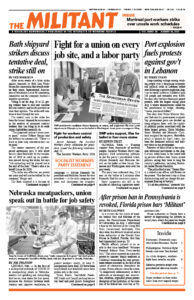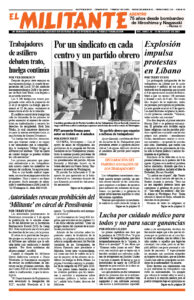Working people around the world are taking action on the shop floor and in the street to resist the propertied rulers’ moves to deepen the exploitation of labor upon which their state power is based. The bosses’ “solution” to the crisis wracking their capitalist system today, exacerbated by the ongoing pandemic, is to impose far-reaching job and pay cuts, plus speedup, on workers’ backs.
Some of these fights are highlighted in this issue of the Militant. Packinghouse workers in Nebraska are fighting against the bosses’ push to work faster, standing shoulder to shoulder. These conditions have led to outbreaks of the virus in plants across the state and beyond, resulting in deaths.
Over 4,000 Machinists union members at the Bath Iron Works shipyard in Maine have been on strike since June 22, fighting boss demands to bring in ever more nonunion contract workers, threatening their jobs and livelihoods. A tentative contract agreement is being discussed and debated by strikers.
Over 1,000 longshoremen at the Port of Montreal launched an indefinite strike Aug. 10 over unsafe work schedules that force them to work 19 out of every 21 days.
These fights — and many more worldwide — are important examples of union action being taken to defend the interests of working people. They all need and deserve solidarity.
The crisis has hit the aviation industry hard — from Boeing and Airbus; air travel giants like American and British Airways; and airport workers, from ground crews to those at small shops in terminals.
Owners of both British Airways and London’s Heathrow Airport are deepening their attacks on jobs, wages and working conditions. Dozens of workers organized by the Unite union protested against these attacks at Heathrow and other airports Aug. 10.
British Airways bosses want to cut over a quarter of their 42,000 staff. More than 6,000 employees have been pushed to apply for “voluntary redundancy.” Letters were sent out Aug. 7 to workers telling them they’ve either been laid off or given a chance to be “fired and hired” under a new contract with pay cuts of up to 50%.
Heathrow Airport bosses are pushing permanent pay cuts of 25%. “The airport is using the Covid-19 pandemic,” the Unite union said in response, “to cut pay in order to increase profits in the long-term.”
A wave of strikes in Iran, begun by thousands of contract workers in oil and gas fields spread to some 22 industrial centers the first week of August.
After a three-month strike and nationwide protests, thousands of Nissan workers in Spain forced the bosses of the Japan-based auto giant Aug. 6 to back off for now their threats to close down. Nissan agreed it wouldn’t shutter its factories in Barcelona for at least a year as well as not imposing any mandatory layoffs. Workers voted Aug. 6 to return to production.
In large factories and small plants, class tensions and skirmishes are on the rise. Workers need a fighting union movement in every workplace.
More than 31 million people in the U.S. have been cast out of work by shutdowns. Most now face the loss of meager unemployment benefits or temporary pandemic relief payouts. They are being hung out to dry as the rulers’ two parties, the Democrats and Republicans, maneuver for advantage in the looming 2020 elections, with disdain for the crisis workers, farmers and small proprietors confront today. Working people face evictions, car repossessions and mounting debt. Layoffs and job cuts announced by employers jumped by 54% in July, threatening to stall any economic upswing.
And grocery prices are soaring. According to government statistics, since February beef and veal prices have risen 20.2%, eggs by 10.4%, and poultry and pork by about 8.5%.
The streets of New York and many other major cities are a stark reminder that tens of thousands of restaurants and other small businesses are permanently closed. Since January, more than 3,600 companies have gone belly up, including a growing number of marquee corporations, like J.C. Penney, Whiting Petroleum, Chuck E. Cheese, Hertz and Lane Bryant.
In response to these conditions, struggles and protests by working people are on the rise.

